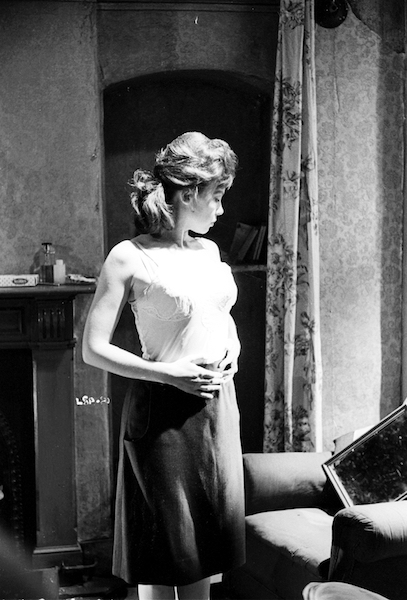Cinematographer Douglas Slocombe is a true prince of darkness here, picking out Leslie Caron’s beautiful eyes and gleaming mouth despite the gloom of a seedy Notting Hill boarding house. Taking a break from her usual roles as a happy hoofer, Caron plays Jane, a serious young French woman adrift in London with an unplanned pregnancy who finds herself renting an attic bedsit.
Adapted from Lynne Reid Banks’s best-selling novel, The L-Shaped Room was very daring in 1962 and the film faced several battles with the censors. Not only does Jane visit a Harley Street abortionist (a creepy Emlyn Williams) but her fellow lodgers include a gay black musician (Brock Peters, fresh from To Kill a Mocking Bird), a couple of prostitutes in the basement (Pat Phoenix on fine form), and an elderly lesbian missing her theatrical days (Cicely Courtneidge). All of them are sympathetic, rounded characters who take Jane (Leslie Caron, pictured below) under their wing.
 But it’s another tenant, Toby (Tom Bell), an aspiring writer, who provides the love interest. The most radical departure in the transfer from book to film is the cultural background of the two central characters; Jane is not the failed English actress of the novel but an au-pair escaping from French provincial life and rigid, wealthy Catholic parents. In the novel Toby is a Jewish Londoner (perhaps based on Wesker or Pinter), but here he's played by Tom Bell, a Liverpudlian in his first leading role. It's possible that the producers in casting him were influenced by the success of those other angry young provincials, Albert Finney in Saturday Night and Sunday Morning and Richard Burton in Look Back in Anger, or perhaps dealing with anti-Semitism along with antagonism to foreigners and homosexuality was just one step too far in a film that isn't otherwise afraid to challenge the status quo.
But it’s another tenant, Toby (Tom Bell), an aspiring writer, who provides the love interest. The most radical departure in the transfer from book to film is the cultural background of the two central characters; Jane is not the failed English actress of the novel but an au-pair escaping from French provincial life and rigid, wealthy Catholic parents. In the novel Toby is a Jewish Londoner (perhaps based on Wesker or Pinter), but here he's played by Tom Bell, a Liverpudlian in his first leading role. It's possible that the producers in casting him were influenced by the success of those other angry young provincials, Albert Finney in Saturday Night and Sunday Morning and Richard Burton in Look Back in Anger, or perhaps dealing with anti-Semitism along with antagonism to foreigners and homosexuality was just one step too far in a film that isn't otherwise afraid to challenge the status quo.
Fascinating as social history, The L-Shaped Room is a downbeat slice of post-war realism, tackling taboos around unmarried mothers, racism and sexuality in its own discreet way. It can't exactly be hailed as a lost feminist work, but Jane does refuse to take easy options, asserts her own independence and is impressively honest about the value of love. While this is very much a studio film with claustrophobic interiors, the location shots of Notting Hill have a documentary realism. This is the era of Colin McInnes's Absolute Beginners and brutal landlord Rachman's grip on the bomb-damaged rental market. In the opening sequence, Jane is accosted by a sleazy teddy boy played by Anthony Booth on a street corner, while Caribbean men are turned away from lodging houses. Later in the film, Smiths fans will recognise the Christmas sing-song with Cicely Courtneidge leading the chorus, which was sampled in The Queen Is Dead.
This restoration showcases Slocombe’s excellent framing – this film is all about close-ups and intimate conversations, dynamic encounters on stairs and dark corners. Bryan Forbes stepped up from his role as scriptwriter to direct when Jack Clayton dropped out – consequently he’s not afraid of letting the dialogue run on a bit, which can make it feel like you're watching an adapted play rather than a novel.
Sadly there’s no commentary as the key film-makers have died, and the supplementary material with this new edition is a little underwhelming. Extras include a drab analysis by two low-key film academics who don't inspire with their insights. Filmed in the same dull cinema setting are two separate interviews with Leslie Caron and Lynne Reid Banks, who is amusing on how much she hated the adaptation but changed her position over the years. Caron,still stunningly beautiful, describes asking Forbes to make Jane less passive and acknowledges that the role was a breakthrough after years of playing smiling ingénues. She was Oscar nominated for her performance as Jane, and well deserved the British Academy award that she did win.
@saskiabaron
Overleaf: watch the trailer for The L-Shaped Room

 But it’s another tenant, Toby (Tom Bell), an aspiring writer, who provides the love interest. The most radical departure in the
But it’s another tenant, Toby (Tom Bell), an aspiring writer, who provides the love interest. The most radical departure in the